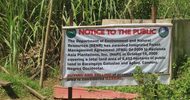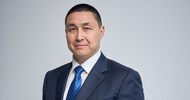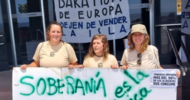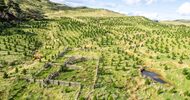Country Wide
01-04-2008 | Marie Taylor
Foreign investors aren't exactly flavour of the month in New Zealand. Especially foreign investors who buy up farmland en masse.
Migrations of people and money have always inflamed emotions, and the move by the wealthy European investor Lisbet Rausing to buy farmland in NZ has certainly raised blood pressures here.
She and her Swedish family live in the United Kingdom, and the Sunday Times ranked them sixth on its British rich list last year, estimating their fortune at £5.4billion.
Since 1999 her NZ farming business The Ingleby Company Ltd has bought about 17 farms. Some have been amalgamated, one sold, and another had part sold off.
Now the company runs just under 20,000ha of land with 130,000 stock units, most of which are sheep and cattle. It's difficult to work out exactly what has been spent, however a current market value of between $600 and $800 a stock unit works out to be close to $100m.
Understandably, the company, the largest foreign owned pastoral farmer in NZ, has taken a very low profile until now, keeping its business largely private.
General manager Rick Braddock, a Kiwi, has been at the helm in NZ since the company was formed. At the time Ingleby showed interest in NZ Rick was a preferred investment facilitator for Investment NZ, an arm of the Government which encourages overseas investment here.
He's encountered a lot of criticism of the company setting up here - including that of foreigners pushing up land values so young Kiwi farmers can't reach it.
"We have never paid more than a registered valuer's valuation. I object to criticism that we are influencing the market. We are buying properties that complement existing properties," he says.
Besides, the process through the Overseas Investment Office is not easy he says. It took seven and nine months for their most recent purchases to get approval.
"This is not a land grab for the sake of buying land; it is the calculated establishment of a portfolio," he says. From now on, most of the growth in the business will come from within the farms, rather than buying more property.
Ingleby is building a global portfolio of which the NZ land plays its part, he says. Lisbet Rausing, through her family trust, owns land in Tasmania, South America, the United States of America, and more recently Romania.
"We take for granted that we are politically stable, non-corrupt and English speaking. Those are the first three reasons why Ingleby looked at investing in NZ, including its reputation for producing food in a sustainable and environmentally friendly way.
"Ingleby has an empathy with the land and people, and I think an investment of this type offers more reward than normal investments in bonds and shares."
Rick's target is to make a five percent return on investment - a big ask for any farmer in the current economic climate.
He admits it's been giving him grief lately because they are not reaching this target.
And the 5% excludes revaluing the land, which is obviously appreciating significantly in value, given the development work which is going into all its farms, some of which haven't been in great shape.
"One of the reasons NZ is less attractive to Ingleby now is to do with interest rates, the exchange rate and the current returns for our products. Our board of directors is appalled with the disarray in the processing industry."
As a result, Ingleby is currently investing in Romania, where they can buy land at a fifth of the value of NZ land.
While most of the NZ's primary industry understandably has to focus on short-term survivability, it shows up that the industry has always been over-leveraged, he says. "At the same time, markets for our products have never been better."
Last July Ingleby took all its managers to Copenhagen. There they saw the largest sheep farm in Denmark which is receiving the equivalent of $8/kg for its lamb. Its prices had gone up 30% on the back of grain prices and they were looking at increasing prices to $11/kg. Why couldn't that happen here? Rick asked.
Ingleby's focus is a network of farms in the Gisborne and East Cape areas, but there are also two farms near Piopio in the King Country. However they've been priced out of that region thanks to the dairying boom, he says.
Part of one of the King Country farms was sold off for a dairy unit which Ingleby decommissioned and amalgamated with its adjoining dry stock finishing farm. In retrospect this was a mistake he says.
And from 2002 to 2004 the company owned Raincliff Station near Timaru, but it didn't fit the farm profile the company wanted long-term.
Proceeds from Raincliff were used to buy two finishing farms, Katoa at Te Araroa and Matahiia at Ruatoria.
"One of the theories of why NZ has such a strong future is our rainfall, and the South Island doesn't fit really well with that." The Gisborne properties are certainly in a higher rainfall belt - most expect 2000 to 3000mm in an average year.
Their scale and price were also advantages. On the downside are isolation, employment issues and erosion.
The Ingleby plan is to be a large scale sheep and beef business, and to finish all its progeny. The current mix of stock units is 80,000 sheep, 10,000 cattle and 4500 deer. "This year we are finishing 70,000 lambs compared with 20,000 last year."
They want to take advantage of their economies of scale, and to also breed their own Angus bulls and rams. They've just bought an elite flock of Perendales ewes with the rams coming from Cheviot and now have a Romdale flock.
Ingleby is a PPCS shareholder, and prefers to supply it, with yearly negotiations. "They take the bulk of our product at the moment."
"I think Ingleby will be loyal to the people it supplies where it believes these people have the right attitude towards the future. We are not one to want to chop and change.
"I would rather not compare us to other farmers. When we purchase a property, as well as looking at its commercial value in terms of productivity, we also look at what we need to do to ensure its long term sustainability."
That normally involves having to look at the whole infrastructure of the farm and improve buildings, access, machinery, fencing, water supplies and consider changing land use on some parts of the farm if necessary.
"We employ people to assess our properties as to their environmental profile, and report on those issues separately to our financial returns. We are thinking 100 years out."
Rick says in the long-term they want to influence what happens with their product right through to the consumer.
That's why they have carbon foot-printed Puketoro Station. "We would like to attach carbon credits to our products, and put labels like sustainable, carbon neutral and traceable on our products."
Ingleby's chairman is a Swedish organic dairy farmer Carl Wachtmeister. As a result, the company is in the process of converting two farms to organics.
They are looking at reducing emissions, and have zero tolerance to allowing erosion or waste back into the ecosystem. Lately, they've signed a memorandum of understanding with the Tindall Foundation which will use Ingleby farms as working models to promote sustainable land management and assist in better understanding climate change management.
It's all part of the sustainability package - in terms of financial, ecological and environmental sustainability. "I don't know if that is achievable, but that will be our goal."
He says the key to their business is the people, and they suffered some well-publicised problems with staff in the early days. "We have learned the hard way a couple of times there. It is much easier to buy the farms than it is to get the management structure right. Employment law in NZ has become quite complex.
"Property is just a raw hard asset; it is the people that manage the property that make it into anything special."
The company employs around 50 staff, plus a lot of casual staff and contractors for fencing, building and shearing.
"We have a fantastic team of managers, with people like Jeremy Williams of Matahiia (who sold his farm to Ingleby) staying on to assist us full time."
He acknowledges he is in a privileged position, heading a debt-free company which has a very strong balance sheet.
"I am fortunate to work for people who have long-term views and a strong desire to leave the land in a better state. But we are not complacent; if anything we are more diligent."
His own background in farming began with an agricultural commerce degree at Lincoln, followed by work with the Rural Bank. He is a registered valuer, and moved into corporate finance and investment banking.
Living in the middle of Auckland, he gets to drive a tractor and ride a horse on the weekends because he leases Motutapu Island in the Hauraki Gulf.
It runs up to 15,000 stock units on 1200ha of grass, while the other 200ha has an ecological and cultural restoration focus.
He is a professional director and currently sits on the board of the country's largest appliance buying group Appliance Connexion, which represents the independent retailers of appliances, some of whom trade under the 100% brand, plus unidentified operators such as LV Martin.
"This gives me exposure to the retail sector right through the country and a completely different section of the community."
He has also been on the advisory board of Haldon Station, near Fairlie, for years.
He says while the Ingleby business here is inspired by its overseas ownership and board, he sees it as a NZ company run by New Zealanders.
It's hard to disagree with him.
 Country Wide
Country Wide













